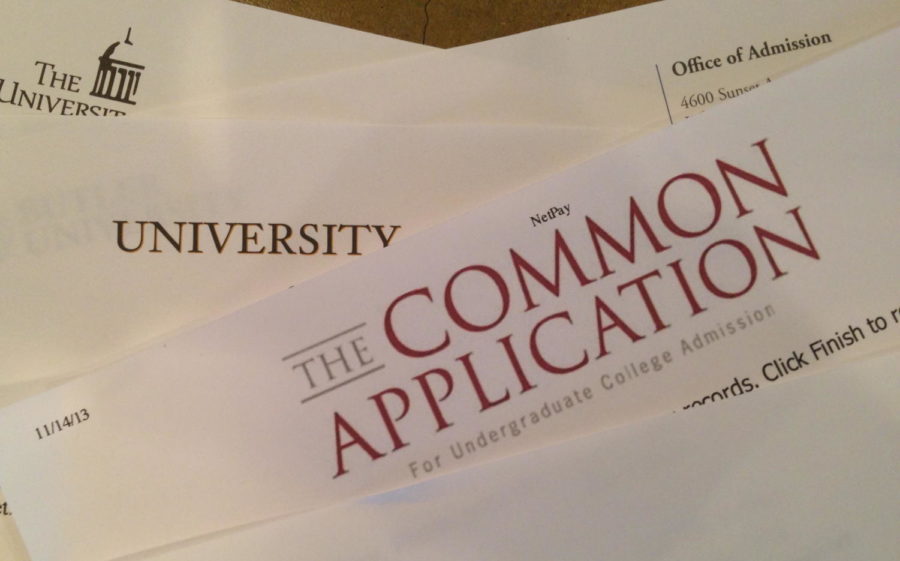By Students, For Students: Everything You Need to Know About College Applications
College Application deadlines are approaching. Learn how to deal with them and be successful.
College application season is currently underway, and it can be a confusing time for some students. This guide will hopefully clear up some common questions about the application process and provide tips.
To begin, most students will need to complete the Common App (used for over 800 colleges and universities) or the Coalition App (used for 150 colleges and universities). Some colleges and universities, such as the University of California system, have their own respective platforms where students can apply. Students who are planning on applying to California State Universities (CSU) must use the CSU platform.
There are some prominent differences between how students can apply. Aside from Regular Decision, some colleges have specialized admission types — which can include the following:
- Early Action (EA): students can apply early to as many colleges and universities they want since it is non-binding. Students applying early will be notified of their acceptance status before the regular decision response.
- Restrictive Early Action: students can apply to a maximum of one school via restrictive early action. This is also non-binding; however, they can only apply to one school under Restrictive Early Action. Check your college’s website for more information on their specific application policies.
- Early Decision (ED): students can apply to a maximum of one school via Early Decision. This is binding; therefore, if they are accepted to the school they applied to via Early Decision, they must attend that school. Students that apply Early Decision usually have a higher chance of getting into the school, provided that their academic performance and extracurricular are on-par.
With that being said, it is recommended that students apply under Early Action or Early Decision if their application is complete. Most schools have a deadline of Nov. 1 or 15 for Early Action or Decision. Regular Decision can range anywhere from the end of November to mid-February.
Regarding the academic profile, students should begin with their official scores. Some colleges expect students to self-report their scores, which can be tedious. However, this saves the student money and he or she does not have to pay to send his or her official scores. While students do not have to pay to send their transcript, it is unrealistic to send an official transcript to every school for review during the application process. Students must report their grades as accurately as possible; failure to do so will result in consequences.
Colleges do require students to officially send their scores and transcripts after following their acceptance.
One of the important things students need on their college applications is extracurricular activities and awards. When listing these, students must ensure they are not dishonest. Here are some things to consider:
- Most colleges will limit how much students can report; thus, students should list their most meaningful awards and activities.
- Students should remember to always be honest as some schools may take the time to verify your activities and awards, especially if they are accepted.
Another thing to remember is letters of recommendation. Many colleges do not require letters of recommendation. Students should be sure to check the college’s website for confirmation. To begin, students need to have a brag sheet that includes information like standardized test scores, extracurriculars, awards, and personal information. To find a brag sheet template, students can look online or use one that Cam High provides (Join the “ACHS College & Career Center” Google Classroom, go to “Classwork,” and look for “Brag Sheet”). Here are some things to consider:
- Teachers that do not know the student well may not be able to accurately assess who he or she is as a person. Most colleges recommend that students ask sophomore or junior year teachers to write a letter.
- Students must give the teacher plenty of time to write the letter (a letter written in a few weeks will sound — and look — much better than a letter written in a day).
- When asking someone to write a letter, students should politely ask about the teacher’s progress to make sure the letter is being done and all the necessary information has been provided.
- Students do not have to ask teachers or counselors to write a letter. If they have a good relationship with other people (like custodians, office staff, etc.), students may ask them to write a letter. People from outside school (for example, work, internship, church) can also write letters.
- Once the individual is finished writing the letter, students should provide instructions for submission. Most of the time, the letter will be submitted online via the school’s platform.
- Be sure to thank whoever wrote the letter!
Finally, the most dreaded part of college applications: the essay. Most colleges use the essay to asses students’ on a more personal level. The essay is a way for students to set themselves apart from the rest. A few tips:
- Start early!
- Be honest and genuine.
- Write about something that has meaning.
- Students can write about anything as long as it somehow impacted your life.
- Do not just recount an experience — reflect on it. Why are you talking about it? Why does it matter to you?
- Do not repeat what is already said in other parts of the application; for example, don’t go through an academic profile in the essay.
- While being funny is a way to have your essays be remembered, remember that what you may find funny may not be perceived as “funny” to your reader.
- Answer the question. This is one of the more common tips, yet people sometimes forget!
- Be sure to ask other people for their opinions. The more reviews, the better.
Finally, remember that there is a school for everyone. The school you attend does not necessarily matter; it is what you do with your education that matters.

Hi, my name is Edward and I am a junior this year at Cam High. I joined The Stinger to gain new experiences, and I hope to make the best out of this year....

















































































![Senior Ditch Day... Relaxation or Truancy? [Video]](https://achsstinger.com/wp-content/uploads/2017/10/IMG_7119-900x599.jpg)
![Heavy Rain Hits Cam High [video]](https://achsstinger.com/wp-content/uploads/2017/02/maxresdefault-900x506.jpg)



